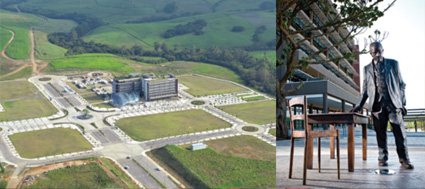
Dube City: Looking at Rapid Office GrowthDube TradePort Corporation is under no illusion about the difficulty that its Dube City faces in competing with the popular office estates of Umhlanga Ridge. “However, when people realise the excellent facilities and great position we have here, they will be interested,” says Tim Hudson, Dube TradePort Corporation’s Senior Manager: Sales and Product Development. The 12-hectare Dube City is a vibrant, cosmopolitan work, play and stay destination just 1km from King Shaka International Airport’s international passenger terminal, 3,3 km from the N2 and 1,8 km from the R102. Offering fully serviced sites with development rights, Dube City is zoned Special Zone 10 (airport). Special Economic Zones around the world always include a central node with offices, commercial outlets and hotels and this is how Dube City is being positioned. It is a priority for this zone to service the industrial node, providing head office or regional office space, for which there is a natural market demand from a convenience point of view. A clear example of this is Dube TradePort Corporation’s head office, 29° South, which is fully tenanted with three of the developers from Dube TradeZone taking up office space. It makes sense for developers and investors in the TradeZone to establish their head offices in Dube City, says Hudson. Also in the tenant mix is the Calypso Group’s 300-seater conference centre, along with a restaurant, coffee and wine bar. The conference centre, which took six months to bring to fruition, is a big improvement at Dube City over the past 12 months. As a destination venue, it is bringing in outside people who not only use the facilities, but are also discovering Dube City for the first time. Pointing out that Dube City is halfway between Durban’s two fastest growing areas - Ballito and Umhlanga - has burgeoning urbanisation behind it in Tongaat and Verulam, through to Cornubia and Phoenix, as well as some quality residential developments on the eastern side of the M4, Hudson says the positioning ‘right in the centre of all of this is incredible.’ There is a lot on the cards and anticipation is that 2014 will be a momentum shifter. Hudson also believes that there will be some relocation from Umhlanga Ridge by those who are looking for a smaller node closer to home and with less traffic. But, the primary objective is to accommodate growth from Dube TradePort-linked investments. With Dube City consisting of just 10 blocks, there is really not very much to develop. Three of the sites are to be developed as parkades, which enable developers to supplement the bulk on their sites and removes the need for developers to build expensive underground parking. For Dube City it is important to get one parkade in place initially to provide public parking. Dube TradePort is looking to invest some of its own capital in lead infrastructure. To this end, it has built its own head office block and intends to build another as they attend to people looking for space on a daily basis. Of the remaining six blocks, a hotel is earmarked for the site directly opposite 29° South. Late last year Dube TradePort Corporation awarded a tender to a design team to work on the drawings for the double basement. The organisation’s R100 million investment in this underground parking will provide it with long-term annuity income, as well as land lease income, whilst also kick-starting the next major development in Dube City. Assisting the hotel development process still further, Dube TradePort Corporation, in January, combined a design team, together with the hotel development team, to work on integrating the underground and top structures. In terms of the hotel’s time-lines, the plans for the double basement are to be submitted to the Municipality in April 2014. The approval process is expected to take around four months and the start of construction is expected in August 2014. Another three planned office developments are progressing well with different developers under a Memorandum of Understanding or Reservation Agreement. The developers have submitted proposals to Dube TradePort Corporation and are looking for tenants. Final agreements with the developers are being negotiated so that they can ‘push the button’ with Dube TradePort as soon as anchor tenants are signed-up.
In addition to the underground hotel parking, Dube TradePort Corporation is planning to invest in another office block which could include a call centre, for which there have been a lot of requests. This would provide the organisation with long-term annuity income. “If we have the capital now to invest, we can create an income stream to ensure long-term self-sufficiency and if the market is right, it makes sense for us to do it,” says Hudson. Dube TradePort Corporation’s new office development has started as an internal design process. A tender is soon to be issued for a professional team to put life into its vision and provide the ground work to take the concept to the drawing and pricing stage. “Dube TradePort is not just investing because it has the money,” says Hudson. This will be a commercially viable development as they have completed a market study and business plan to ensure that they know what the returns will be. He believes that the hotel and Dube TradePort Corporation’s own office development will be the catalyst for the precinct. When people see the cranes for the hotel construction and one of the other blocks going up, it will create a lot of momentum.
|
